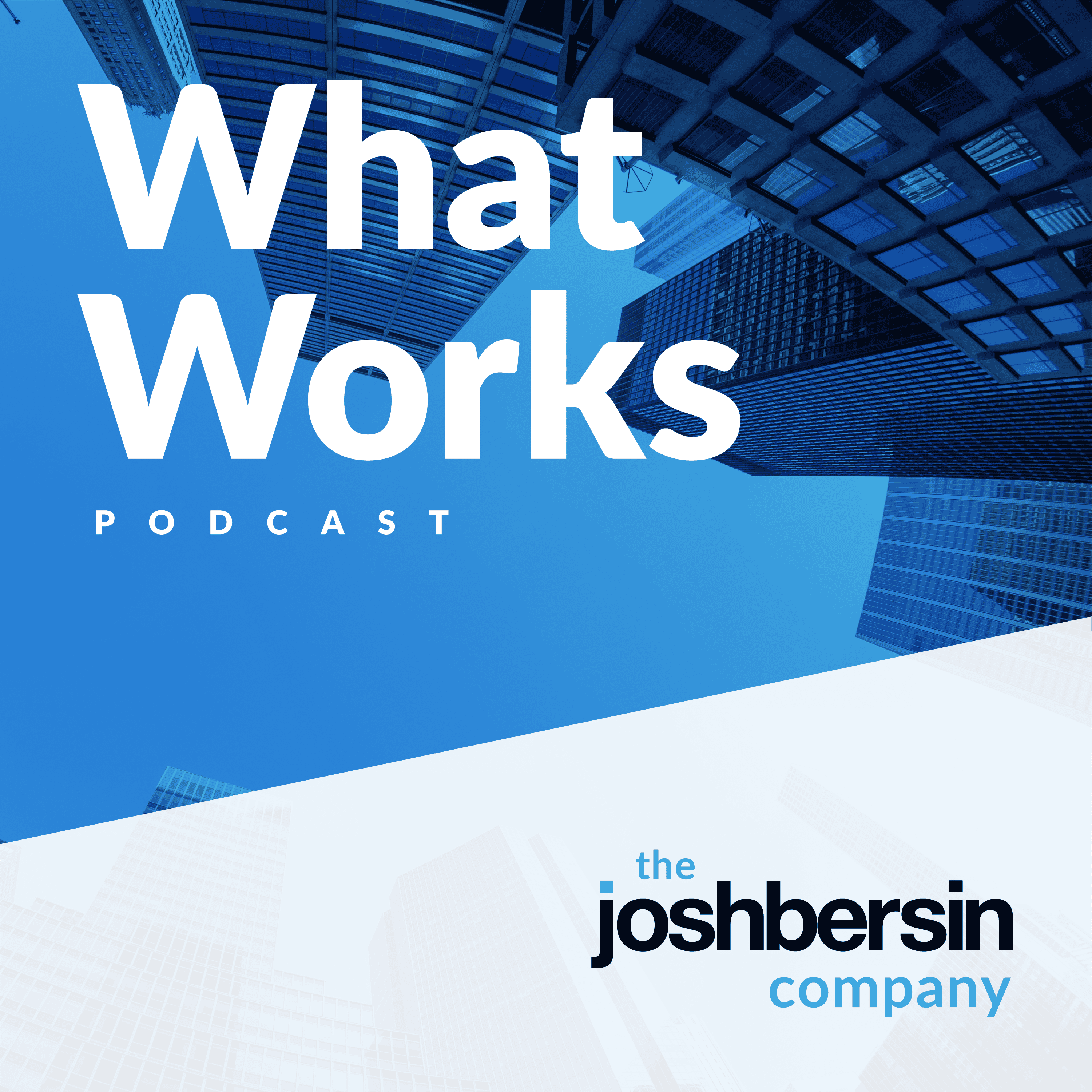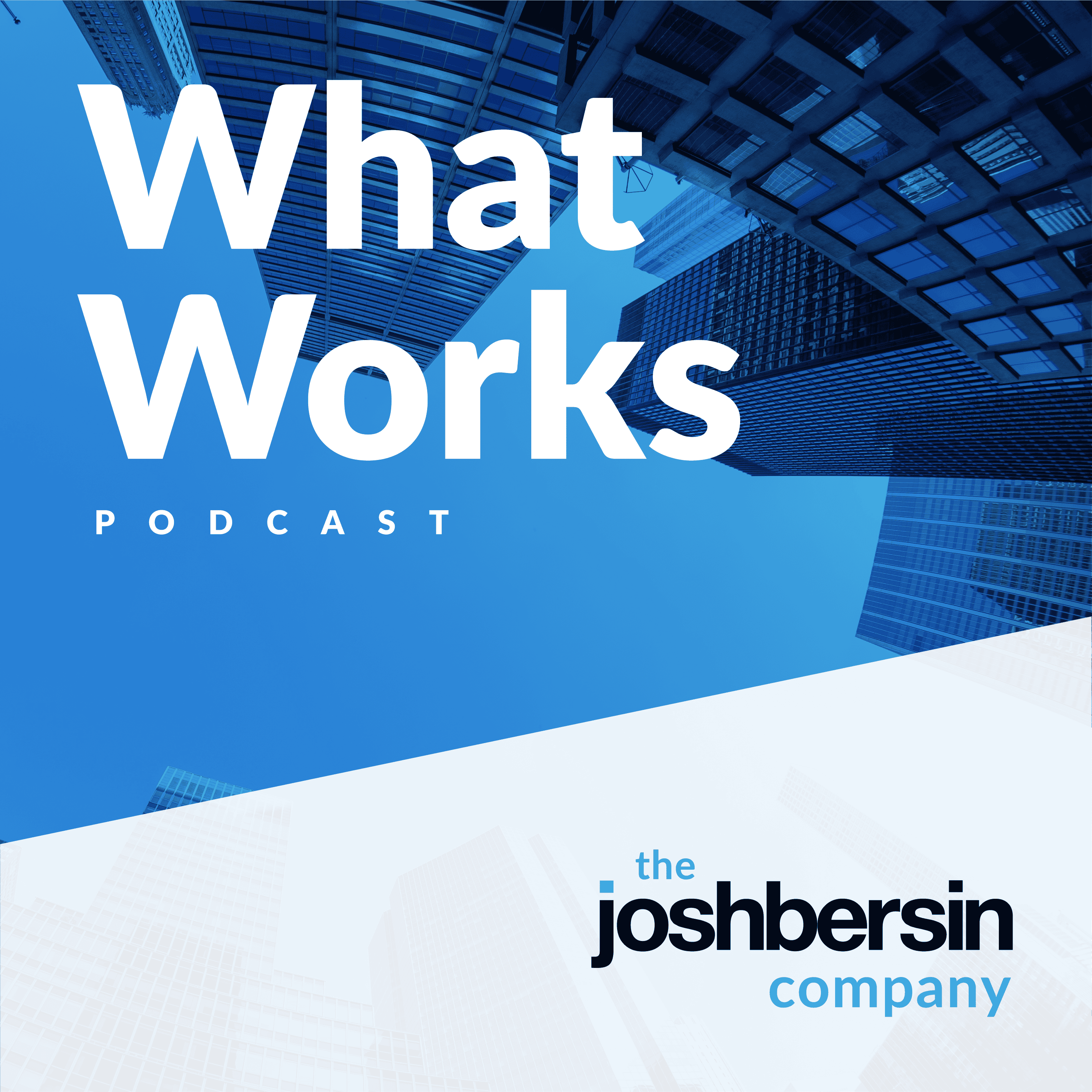Episode Transcript
Speaker 0 00:00:01 Hi, this is Josh person. Welcome to Research-Based Perspectives on the ever-Changing World of Work, leadership, learning, and HR with a heavy dose of insights on the exciting world of HR technology. Hi. Today I'd like to talk about a very confusing, but critically important issue going on in the workforce. Employee engagement. It's a very, very big topic. It's a little bit of an old concept. The idea of employee engagement for the last 20 or 30 years has been how well do employees like their work, like their companies recommend their companies, like their bosses, like their work experience and so forth. And it reflects, uh, many, many issues. We, when I was at Deloitte, I developed a model called Simply Irresistible that looked at 20 different areas of employee engagement, all of which are important. But the funny thing about it, it's been measured for years, and there's lots of companies that survey it, is that most of the research seems to show that amongst the employees and workers that have jobs, the engagement levels are skyrocketing.
Speaker 0 00:01:07 People are more supportive and engaged with their work than maybe ever before. And this is happening in the middle of the most confusing, uncertain, risky time in the workforce in my life. The pandemic. And let me just talk a little bit about the data and then we'll talk about why we think this is that. There's two STU studies that came out last week, and there's many others. The first is by Gallup. Gallup has been doing this for many, many years, and Gallup has a particularly unique way of studying this. And they look at employees that are engaged and then employees that are disengaged and companies and employees that are actively disengaged. An actively disengaged employee is someone who is so unhappy that they would undermine the company or disparage the company. And in their study, they came out in May, just actually the end of May of 2000, 20, 38% of employees are engaged and 13% are actively disengaged.
Speaker 0 00:02:07 That gap is the highest gap they have ever seen in all of the years that Gallup has been doing this. Um, so their data shows that employee engagement is at an all time high. Uh, and I've been looking at this for a long time, and if you go back all the way to the year 2000, which was two recessions ago, in the year 2000, 26% of employees were engaged and 18% were disengaged. So we've gone from 26 to 38 engaged, and from 18 down to 13, disengaged very, very amazing findings over the last 20 years. And it all peaked in the last three to four months through the pandemic. The second study I wanna highlight just in terms of the data, is a company called Quantum Workplace that has something called the Best Place to Work, which is a survey that goes out to lots of employers in small cities and many, many different companies, more than a million people have taken this survey.
Speaker 0 00:03:08 And so they went back and looked at the data from 2019 to 2020, and they found again, that as of the end of May of this year, just in the last few weeks, the numbers are the highest they have ever been. And that year over year engagement is 11% higher than it was a year ago. Leadership's, 83% of people believe their leaders value them as their most important resource, which is very high. 77% believe that the organization is communicating well and effectively, 77% believe they are paid fairly, which is ex extremely high, 7% year over year increase. And 85% believe their benefits meet their employees need. So what does this all mean? There's a couple of ways to interpret this and, and I think it's important to sort of think about all them. The first is a lot of people have lost their jobs. Roughly 12 to 15% of the American workforce is out of work or underemployed.
Speaker 0 00:04:07 And so those of us that have jobs are happy to have them <laugh>. So we're probably more forgiving of our employers than we may have been during the hype cycle right before this. That's probably one thing that's going on, but that's really not enough because people are pretty honest in these surveys. And when they're not happy, they let the survey people know. The second thing though, that I think this indicates is something that I've seen in many, many other studies we've done over the last couple months. And that is that in a pandemic, in this pandemic in particular, there is no way to drive performance in your company unless people feel safe. And the word safe means physically safe, psychologically safe. Our families are safe, our parents are safe. Our entire work experience is safe. And we will not serve customers unless we feel safe.
Speaker 0 00:05:05 Because in virtually every industry, whether it be airlines, telecommunications, financial services, banking, retail, hospitality, food service, whatever you name it, the biggest problem most companies have is how do we get the customers to come back? And under what conditions can we create a customer experience that they feel safe? And if the employees don't feel safe, the customers won't feel safe. And I'll give you a funny story about this. I was on the phone with a high-end hamburger company in the UK called Honest Burgers a week ago, and they have 40 or 50 high-end hamburger, uh, restaurants all over London in the uk. And you know, a restaurant is not exactly an easy business to be in right now, if you can be in business at all. So they've opened some of the restaurants up, but what they found was that not only do they have to do all sorts of things to keep the restaurants safe and to create new protocols for seating and standing in line and service and wear masks, but the employees have to get to the restaurants and nobody wants to go on public transportation.
Speaker 0 00:06:06 So it was a big problem. So what they did, they ended up using some pretty cool technology. They basically used Google Maps and some other tools to figure out which stores would be close enough to their employees so that they could get a full staff of workers to come to that store by foot or by bicycle without going on public transportation. And they use that as the criteria to open the stores. What better way for make employees feel good about their work experience? That's just one of hundreds of examples. We are just finishing a whole research report on this. And what you're finding in, in all of these conversations is that companies are looking now at their core mission, their core purpose, their core values as a business and saying, given that so many things have changed in our customer experience, in our customer environment, what do we do for a living?
Speaker 0 00:06:57 And how can we do it in the most meaningful, safe and sustainable way for our customers and therefore for our employees and employees love that. And this is a big driver, I think, of this employee engagement numbers. The third thing is flexibility. Many, many studies have been done that show one of the most frustrating things in a job is a lack of flexibility. Your kid's sick, you're not able to get to a meeting, your boss is breathing down your neck. You need some time, you need some patience, you need some flexibility. Nope, you gotta be there. And that is, for some people, a reason to quit. And flexibility has suddenly become the center of the work experience. You can work at home, we'll pay for your computer and your internet, we'll give you flexibility to attend meetings with the camera on or off. Uh, you know, maybe you can skip the meeting if your kids are home studying and you can come back later and finish when you have time.
Speaker 0 00:07:56 I mean, these are things that fall into the category of forgiveness, patience, flexibility, respect that, you know, we don't think about during the peak of the economic cycle. They have all become commonplace in business. So, so I think that's the third reason. The fourth thing that's going on in the economy, which is both a good and a bad thing, is wages. Now, the, the difficult, sad, and very dysfunctional thing that's going on in the United States, and I think this is true in most countries, is that according to adp, 80% of the people that lost their jobs in the pandemic make less than $50,000 a year. So this has been a pandemic that accelerates the income inequality that we already had. So for the people taking these surveys that are working, they tend to be slightly higher wage workers. Even a delivery truck driver who's working extra hours is probably gonna make 40 or $50,000 a year or more.
Speaker 0 00:08:56 But for those that are working, what all of our research shows, including discussions with more than 160 CHROs, is that wages have gone up. Companies have r raised hourly wages for everybody. Target has done this, Walmart has done this, Verizon has done this. Other companies have done this to accommodate the difficulties, financial and otherwise, that people are going through. Benefits have become more flexible and more generous. And we've started to give people more financial support for things that we didn't in the past. Lots of companies now pay for assistance or tools for homeschooling. We obviously pay for healthcare and test testing. Sick pay used to be kind of hard to get. Now it is automatic because obviously if you want people to stay home, if they're sick, we need to pay them, otherwise they're gonna show up sick. So wages have actually gone up. Now, the BLS data doesn't show that too much yet, but all of our research shows it to be true.
Speaker 0 00:09:54 Will this fix the income inequality problem? It's very hard to say, I, I can't say that it will, but it's an indication that we've changed the philosophies of leadership, the philosophies, philosophies of business, and you know, employees really are at the center. The final thing I want to mention on this topic is generally speaking, how do we think about employees in the capitalistic economy that we have? And one of the things I've learned as an HR analyst for the last 20 years, I spent 20 years as a business guy before I got into hr, is that regardless of the industry or the economic cycle or a faster growing or how screwed up your company is, the only way any company will succeed is for the people to succeed. I mean, I remember it was Dave Duffield at Workday who stood up in front of 7,000 customers and said to his customers, you are not my number one priority.
Speaker 0 00:10:51 You are my number two priority. My number one priority is my employees. If I take care of them, they will take care of you. And even though this sounds like platitudes, a lot of CEOs are realizing this right now. It isn't okay to say things like this and not deliver during the top part of the economic cycle when everybody's making a lot of money. It's easy to say things like this but not do anything about it. Now we have to do something about it. So we're in a situation where HR leaders, business executives are thinking harder than ever about what they could do to make every individual successful in their company and give managers and leaders the support they need to coach and develop and align people. Well, it turns out in a well running company, the most at risk or stressed roles are usually leadership roles.
Speaker 0 00:11:49 Leaders are being asked to do jobs and help other people do jobs and hold people accountable and create incentives and understand all these psychological and physical issues at work. And right now, most companies we're surveying have told us that that is their biggest challenge. And we're gonna be publishing some new leadership principles later this month that'll help you understand what's changed. And so CEOs are supporting leaders. They're getting on video calls, they're having standup meetings every day or every week. They're willing to spend more money on employees. And sure enough, the economy is growing. I mean, I'm not saying we're in a good state at all, but we are creating jobs. ADP believes 2 million jobs were created in June and May or in June, excuse me, I don't believe the Bureau of Labor Statistics numbers at all. I would suggest you discount them. But lots of evidence shows that people are starting to come back to work and that employers are doing a reasonably good job of taking care of people.
Speaker 0 00:12:49 The final point I will make about employee engagement is that it is a complex never ending issue. Um, even though we've done a lot of research and a lot of people have written articles about the number one thing that's the most important, whether it be having a friend at work or your relationship with your manager or your pay or whatever it may be, that's just not the way it works. Everybody's life is a little bit different. We all have different expectations and needs and desires at different points in our careers. And the best companies fulfill those expectations for people in a meaningful way. And they look at that as part of their mission because I think companies are, in a sense, part of our society. We are not just profit making enterprises sitting on the side. We are society. And when companies act in a way that contributes to the collaboration, the growth, the development, the forgiveness, the kindness and the needs of people who we call workers or employees, we become a positive society in our own.
Speaker 0 00:13:58 And I call that citizenship and study after study. And all the research I've done over the years shows that the most enduring companies, the companies that endure multiple economic cycles that go on for tens to hundreds of years, not the high flyers that have been around for 20 or 25 years, a lot of those companies go away. The highly enduring companies are essentially treating the society and their employees like citizens. They understand they have a voice, they understand they have different needs, they understand that they will come and go in different ways, and that they work in groups and they need to be connected to each other in a positive way. They want meaning, uh, they need fair pay, they need benefits. All those things are, to me, citizenship issues to say nothing of Black Lives Matter, pay, equity, fairness, transparency. And I think we're in an era right now because we so see so little collective thinking in the political sphere that companies are stepping up to this.
Speaker 0 00:14:57 And that's another reason that I think these engagement numbers are so high. Will they stay this high? I don't believe they will. I think we're in a very unique period of time when companies are bending over backwards to take care of people as positive a thinker as I am. I, I'm not unrealistic. And I'm sure that when the economy comes roaring back again, we'll go back to somewhat of the behavior we had before. But every time one of these things happens, we learn the lesson that we take with us. So let's look at this as positive. Use it as an example to make decisions in your company. And I'm always interested in your feedback. Who would've guessed that it took a global pandemic and one of the worst viruses we've ever seen in our lifetime to drive employee engagement to an all-time high? It's a fascinating, uh, situation and I hope you can all learn something from this. Thank you.
Speaker 0 00:16:08 If you like what you heard, please join the Josh Bersen Academy, the world's professional development academy for hr for less than a cost of a nice dinner in a town near you. You can have an entire year's access to hundreds of courses, articles, research studies, case studies, and an entire community of more than 10,000 HR professionals all collaborating with each other to help you learn and solve the problems in your particular company. We call the Burson Academy, the world's home for hr, and you'll find it to be one of the most important parts of your career and your company's HR strategy for the years ahead. Thank you.


